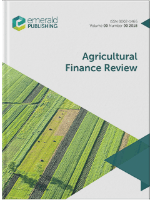
Agricultural Finance Review
Scope & Guideline
Navigating the Future of Farming Finance.
Introduction
Aims and Scopes
- Agricultural Credit Access and Utilization:
Research on the accessibility, demand, and impact of agricultural credit on farmers, including studies on microfinance, formal banking, and alternative credit sources. - Risk Management in Agriculture:
Exploration of various risk management strategies, including crop insurance, weather-indexed insurance, and financial instruments designed to mitigate agricultural risks. - Economic Impact of Financial Policies:
Analysis of how agricultural financial policies and government interventions affect farming operations, productivity, and rural development. - Technological Innovations in Agricultural Finance:
Investigation of how digital finance, data analytics, and technological advancements are transforming agricultural finance and credit delivery systems. - Financial Literacy and Inclusion:
Studies aimed at understanding the role of financial literacy in improving farmers' financial decision-making and promoting inclusive financial systems. - Sustainability and Environmental Finance:
Research focusing on the financial aspects of sustainable farming practices, climate change adaptation, and environmental conservation initiatives.
Trending and Emerging
- Digital Finance and Innovation:
There is a growing emphasis on the role of digital finance, including mobile money and online lending platforms, in enhancing access to credit for farmers, particularly in developing countries. - Climate Finance and Risk Management:
Research increasingly addresses the intersection of climate change and finance, focusing on how financial instruments can support climate resilience and sustainable agricultural practices. - Impact of Financial Inclusion:
The theme of financial inclusion is gaining traction, with studies examining how increasing access to financial services can improve agricultural productivity and farmer welfare. - Data-Driven Decision Making:
The use of big data and machine learning in predicting agricultural outcomes and informing financial decisions is becoming a prominent area of research, reflecting the trend towards data-driven agriculture. - Social and Economic Impacts of Credit Access:
Emerging studies are exploring the broader social and economic implications of credit access, particularly for marginalized groups such as women and beginning farmers.
Declining or Waning
- Traditional Credit Models:
There is a noticeable reduction in studies examining traditional agricultural credit models as researchers increasingly focus on alternative financing mechanisms and digital innovations. - State-Sponsored Agricultural Programs:
Research on government-sponsored agricultural credit programs appears to be declining, possibly due to a shift towards evaluating private sector and alternative financing solutions. - Basic Agricultural Economics:
Studies that primarily focus on basic agricultural economics without integrating financial aspects seem to be less emphasized, as the journal moves towards more interdisciplinary approaches. - Local Food Systems Financing:
While local food systems were previously a focus, the trend indicates a decrease in research specifically addressing their financing, possibly due to broader discussions on global supply chains and sustainability. - Historical Agricultural Financing Practices:
There is less emphasis on historical analyses of agricultural financing practices, as newer methodologies and contemporary issues take precedence in current research.
Similar Journals
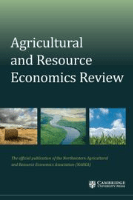
Agricultural and Resource Economics Review
Shaping Policy with Cutting-Edge Agricultural ResearchAgricultural and Resource Economics Review is a leading peer-reviewed academic journal published by Cambridge University Press, dedicated to advancing scholarship in the fields of agricultural and resource economics. Since achieving Open Access status in 2016, it has significantly broadened its reach, allowing researchers, professionals, and students across the globe to engage with cutting-edge research and innovative methodologies. The journal, which boasts an impact factor reflective of its strong standing in both Agronomy and Crop Science (Q2) and Economics and Econometrics (Q2), aims to provide a platform for the dissemination of high-quality research that informs policy and practice in the agricultural sector. With a publication history spanning from 2004 to 2024, the journal continuously strives to foster interdisciplinary exchange and contribute vital insights that shape sustainable resource management. Emphasizing quantitative analysis and empirical research, Agricultural and Resource Economics Review remains a crucial resource for those involved in the dynamics of agricultural economics and resource management in today's ever-evolving landscape.
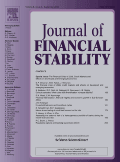
Journal of Financial Stability
Exploring innovative solutions in finance and economics.The Journal of Financial Stability, published by Elsevier Science Inc., is a renowned academic journal that serves as a premier platform for the dissemination of innovative research in the fields of finance, economics, and econometrics. With an ISSN of 1572-3089 and an E-ISSN of 1878-0962, this journal has established itself as a leader in its category, ranking Q1 for both Economics and Finance in the 2023 category quartiles. This positions it amongst the top 13% of journals in Economics and the top 35% in Finance, according to Scopus rankings. Covering a wide range of topics related to financial stability, the journal aims to fulfill its objective of advancing scholarly communication and providing researchers, professionals, and students with valuable insights into contemporary financial challenges and innovations. Operating from the Netherlands and converging from 2004 to 2024, the Journal of Financial Stability continues to contribute significantly to the academic landscape, inviting submissions that push the boundaries of knowledge and understanding in financial systems.

African Review of Economics and Finance-AREF
Fostering Knowledge Exchange on African FinanceAfrican Review of Economics and Finance (AREF) is a distinguished academic journal dedicated to advancing knowledge in the fields of economics and finance within the African context. Published by PORTHOLOGOS PRESS, the journal aims to provide a platform for research that addresses critical economic and financial issues that affect Africa, promoting innovative solutions and fostering discussion among scholars and practitioners. With its ISSN 2042-1478 and E-ISSN 2410-4906, AREF has established itself as a vital resource for researchers, professionals, and students seeking to deepen their understanding of African economies. The journal’s commitment to open access ensures that its valuable research findings are readily available to a global audience, thereby enhancing visibility and engagement. Through rigorous peer-review processes and thoughtful editorial leadership, AREF contributes significantly to the discourse on economic development, policy analysis, and financial practices in the region.
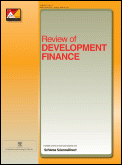
Review of Development Finance
Exploring the Future of Finance in DevelopmentReview of Development Finance is a peer-reviewed academic journal dedicated to the exploration and promotion of innovative research in the fields of development finance, economics, and econometrics. Published by AFRICAGROWTH INST in South Africa, this journal serves as a vital platform for scholars and practitioners to share their insights on the financial mechanisms that drive development, particularly in emerging economies. Despite its current impact factor reflecting its nascent status within the lower quartiles (Q4) of its categories, Review of Development Finance aspires to contribute to the understanding and progression of finance as a tool for accelerating development from 2011 to 2024 and beyond. It encourages submissions that challenge conventional wisdom and provide empirical evidence supporting the role of finance in attaining sustainable growth. By fostering an open exchange of ideas amongst researchers, professionals, and students, this journal aims to enhance the discourse surrounding development finance and inspire impactful solutions to global economic challenges.
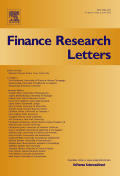
Finance Research Letters
Shaping the future of finance with high-quality research.Finance Research Letters, published by Academic Press Inc Elsevier Science, is a leading journal in the field of finance, recognized for its exceptional impact as indicated by its Q1 ranking in the Finance category of the Scopus Index, placing it in the top 6% of journals in this area. With an ISSN of 1544-6123 and an E-ISSN of 1544-6131, this journal has been a crucial platform for disseminating cutting-edge research since its inception in 2004. It covers a wide array of topics within finance, including but not limited to portfolio management, risk assessment, and financial innovation, making it an invaluable resource for researchers, professionals, and students committed to advancing their understanding of the financial sector. Although it does not currently offer open access, its contributions to the field are amplified by its impressive Scopus rank of #19 out of 317 in the Economics, Econometrics and Finance category. As the journal continues through its convergence years until 2024, it remains dedicated to publishing high-quality, peer-reviewed articles that reflect the latest trends and innovations in financial research.
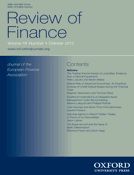
Review of Finance
Pioneering high-quality research in finance and beyond.The Review of Finance, published by Oxford University Press, stands as a premier academic journal in the fields of Finance, Accounting, and Economics. With an ISSN of 1572-3097 and an impressive track record stretching from 2001 to 2024, this journal is consistently recognized for its high-quality research, reflected in its Q1 rankings across key categories, including Accounting, Finance, and Economics and Econometrics. The Review of Finance is dedicated to advancing the understanding of financial phenomena through robust empirical and theoretical insights, making it an essential resource for researchers and professionals alike. Additionally, its strong Scopus rankings, placing it in the top percentiles, highlight its influence and relevance in ongoing academic discourse. Although the journal is not open access, it remains widely accessible through academic institutions, ensuring that its valuable contributions reach an extensive audience. The editorial board invites submissions that promise to further engage the academic community in the dynamic intersections of finance, accounting, and economic research.
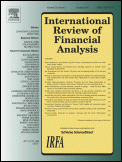
International Review of Financial Analysis
Empowering scholars to shape the future of finance.The International Review of Financial Analysis, published by Elsevier Science Inc, is a premier journal dedicated to advancing the fields of finance and economics. With an impressive impact factor and ranked in the top quartile (Q1) of both Economics and Econometrics and Finance categories, this journal is recognized for its high-quality research and significant contributions to the discipline. Since its inception in 1992, it has provided a platform for scholars to present innovative theories and empirical studies that address critical financial issues around the globe, making it a vital resource for researchers, professionals, and students alike. Although it does not offer open access, the journal actively engages with contemporary debates in financial analysis, ultimately empowering its readership to contribute to and benefit from the ongoing discourse. With its convergence of financial research and analytical methodologies through 2024, the International Review of Financial Analysis remains a cornerstone in the pursuit of knowledge within the ever-evolving landscape of finance.

International Journal of Financial Studies
Fostering collaboration and insight in financial studies.The International Journal of Financial Studies is a premier publication dedicated to advancing the field of finance through open-access research. Published by MDPI based in Switzerland, this journal offers researchers, professionals, and students a platform to disseminate their findings in an accessible format since its establishment in 2013. With its ISSN of 2227-7072 and a commendable impact reflected in its Q2 ranking in finance, it occupies an influential position among finance-related journals, as evidenced by its 65th percentile rank in Scopus. The journal encompasses a wide array of topics in finance, making it essential reading for those seeking to stay abreast of current research trends and methodologies. As an open-access journal, all articles are freely available, significantly enhancing the visibility and reach of published studies, which is crucial for fostering collaboration and innovation within the global financial community. Published continuously until 2024, the International Journal of Financial Studies is not just a source of knowledge; it is a critical contributor to the progression of financial scholarship.
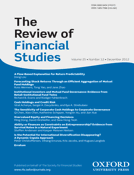
REVIEW OF FINANCIAL STUDIES
Fostering Knowledge in the World of FinanceREVIEW OF FINANCIAL STUDIES, published by Oxford University Press Inc, stands as a premier academic journal in the realms of accounting, economics, and finance. With an impressive Impact Factor that reflects its high citation rates and broad influence, this journal, with an ISSN of 0893-9454 and E-ISSN 1465-7368, is considered a cornerstone for researchers, academics, and professionals seeking to contribute to and stay updated on groundbreaking developments in financial studies. Since its inception in 1996, it has established a robust reputation, consistently ranking in the Q1 category across multiple disciplines, highlighting its elite status in the global academic landscape. The Scopus rankings further reinforce its importance, positioning it at the forefront of business, economics, and finance research. While the journal is not open access, it offers vital insights and comprehensive studies that foster a deeper understanding of contemporary financial issues and methodologies. Located in the United Kingdom, the REVIEW OF FINANCIAL STUDIES is an essential resource for those aiming to advance their knowledge and research in this dynamic field.

Annual Review of Financial Economics
Catalyzing Discourse in Economic and Financial ResearchAnnual Review of Financial Economics, published by Annual Reviews, stands as a pivotal journal in the fields of Economics and Finance, recognized for its rigorous analysis and comprehensive reviews since its inception in 2010. With an impressive impact factor reflected in its Q1 ranking in both Economics and Econometrics and Finance for 2023, this journal serves as an essential resource for researchers, professionals, and students keen on understanding the dynamic interplay of financial theories and practices. The ISSN 1941-1367 and E-ISSN 1941-1375 signal its commitment to accessibility and dissemination of cutting-edge research within the community. Addressing crucial topics from market behavior to economic modeling, each annual volume synthesizes the latest findings and theoretical advancements, thus contributing significantly to the global discourse within financial economics. With its high Scopus rankings, including a finance rank of #75 out of 317, the journal continues to foster a deep understanding of financial systems and their implications, serving as an invaluable tool for anyone engaged in the broader economic landscape.